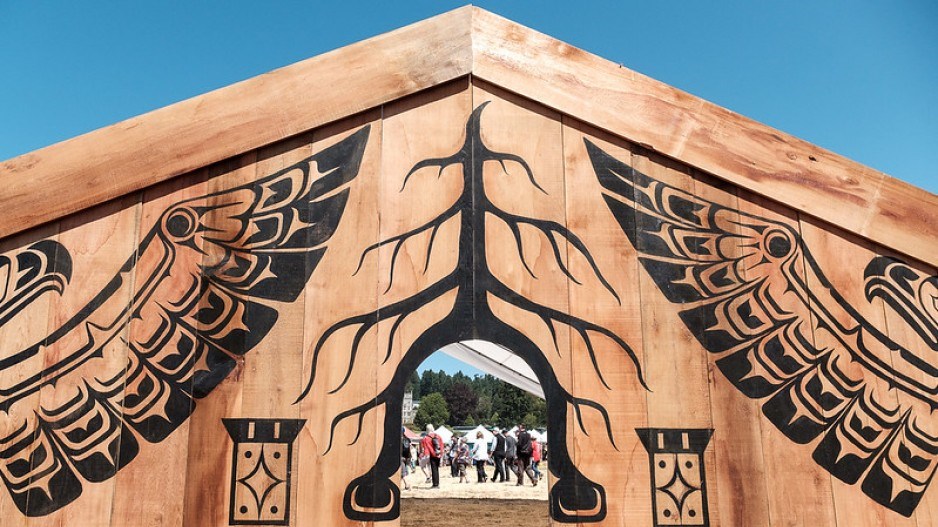British Columbians have discussed reconciliation with Indigenous Peoples more profoundly, and for longer, than residents of other Canadian regions.
In March, the provincial government made the National Day for Truth and Reconciliation a statutory holiday. The importance of establishing meaningful connections with Indigenous governments has not been lost on industry leaders across the province.
When Research Co. and Glacier Media asked British Columbians recently about four concepts, an interesting narrative developed. Practically two-thirds of the province’s residents (65 per cent) have a positive opinion of reconciliation, defined as establishing and maintaining a mutually respectful relationship between Indigenous and non-Indigenous peoples in Canada.
On economic reconciliation – the process of making economic amends for historical injustices to Indigenous Peoples – the public is not as convinced. Half of British Columbians (50 per cent) have a positive opinion of this concept, while 38 per cent hold negative views.
The significant difference in positive perceptions between these two concepts is mostly generational. British Columbians aged 18 to 34 go from 66 per cent on reconciliation to 59 per cent on economic reconciliation. The gap becomes larger among their counterparts aged 35 to 54 (57 per cent for reconciliation and 49 per cent for economic reconciliation). Among those aged 55 and over, the changes are drastic: 72 per cent favour reconciliation, but only 43 per cent feel the same way about economic reconciliation.
More than half of British Columbians (55 per cent) hold positive views on self-determination, or the right of Indigenous people to determine their political status and freely pursue their economic, social and cultural development, and to dispose of and benefit from their wealth and natural resources. Half of the province’s residents have a favourable view of self-government, or the existence of negotiated agreements that set out law-making authority in areas such as governance and economic development.
British Columbians are not shy when asked what elected officials should do. In October, more than 40 per cent told us that the three levels of government were not paying enough attention to the environment. On reconciliation, the attitude is different. Fewer than a third of British Columbians believe the federal government (30 per cent), the provincial government (31 per cent) and their municipal government (also 31 per cent) need to do more to foster economic reconciliation.
When it comes to economic reconciliation, some ideas seem easier to implement than others. More than two-thirds of British Columbians (68 per cent) support promoting resources and education opportunities for Indigenous people across the province. Support is lower (53 per cent) for increasing Indigenous representation on boards of directors.
Across the province, most British Columbians agree that Indigenous communities should decide if natural resource projects can be established on their territories (54 per cent) and what type of housing projects can be built on their territories (62 per cent).
When it comes to solutions of a political nature, we are left with more questions than answers. In October, Australian voters participated in a referendum on the creation of an advocacy committee to advise parliament on policies affecting Indigenous people. When all votes were tallied, the proposed law – which would have altered Australia’s constitution – was rejected by 60 per cent of voters.
When we posed the question to British Columbians, more than half (54 per cent) were in favour of establishing advocacy committees to advise both the federal House of Commons and the provincial legislative assembly on policies affecting Indigenous people. This is roughly the same level of support that the “yes” side had in Australia when debate over the proposed amendments began.
British Columbians are divided when pondering the concept of establishing a quota for Indigenous candidates in federal elections (40 per cent support the idea and 43 per cent oppose it) and provincial elections (41 per cent in favour and 41 per cent against).
There is no unanimity in B.C. on how to carry on. While many residents endorse action in the form of promotion and education for Indigenous Peoples, support is lower for mandating the presence of First Nations on boards. Politically, an advocacy committee is preferred to a mandated quota to ensure that Indigenous Peoples have a voice in legislative decisions.•
Mario Canseco is president of Research Co.
Results are based on an online study conducted from Nov. 4-6, 2023, among 800 adults in B.C. The data has been statistically weighted according to Canadian census figures for age, gender and region in B.C. The margin of error is plus or minus 3.5 percentage points, 19 times out of 20.




